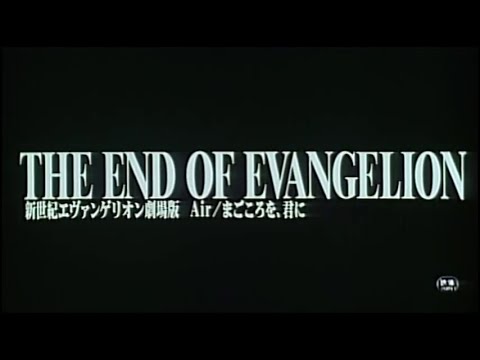“The End of Evangelion (Japanese: 新世紀エヴァンゲリオン劇場版 Air/まごころを、君に, Hepburn: Shin Seiki Evangerion Gekijoban: Ea/Magokoro o, Kimi ni, lit. ‘Neon Genesis Evangelion Theatrical Edition: Air/Sincerely Yours’), or Neon Genesis Evangelion: The End of Evangelion, is a 1997 Japanese animated apocalyptic psychological drama film written by Hideaki Anno, co-directed by Anno and Kazuya Tsurumaki, and animated by Gainax and Production I.G. The film serves as a parallel ending to the anime television series Neon Genesis Evangelion, which aired from 1995-1996 and ended with two episodes that became controversial.
The story centers on Shinji Ikari and his colleagues Rei Ayanami and Asuka Langley Soryu. Shinji is a young pilot of a mecha called Evangelion who is subjected to the Human Instrumentality Project, in which human souls are merged into a single, divine entity. Shinji ultimately accepts himself and rejects Instrumentality, preferring to live as an individual alongside others. The film features the voice actors of the original series, including Megumi Ogata as Shinji, Yuko Miyamura as Asuka, and Megumi Hayashibara as Rei.
Shortly before The End of Evangelion’s release, Hideaki Anno and Gainax studio produced a feature film called Neon Genesis Evangelion: Death and Rebirth that summarizes the first twenty-four episodes of the series. Like Death & Rebirth, the creators conceived The End of Evangelion as a duology comprising “”Episode 25: Love Is Destructive”” and “”Episode 26: I Need You””, remakes of the last two episodes of the original television series. In 1998, the overlapping feature films were edited together and reissued as Revival of Evangelion.
The End of Evangelion became a box-office success, grossed ¥2.47 billion, won awards including the 1997 Animage Anime Grand Prix, and was praised for its scenes of violence, direction, editing, emotional power, and script, though some reviewers criticized its oblique religious symbolism and abstraction.”
ORIGINAL UPLOAD DATE:

